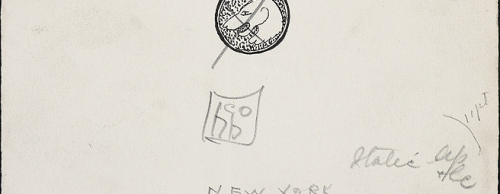Craft Notes
from Feedback

Three or four years ago, I was reading an ambitious student story that made very little sense to me. The language was pleasing rhythmically, sonically, but it was all fairly abstract, too. I found myself writing again and again in the margins: Could this be stated just a little more clearly? Could this be a little more concrete/precise? On a single page, some version of the preceding two sentences appeared five times, and I began wondering what a text composed of only my marginalia might look like. After all, students most likely read what I write in the margins as if it is its own kind of text, one comment after another after another. I held on to this idea for some time, and then finally, earlier this spring, I began creating texts from some combination of my marginalia and end notes. A part of me worries I’m betraying the confidence students place in me when they so bravely hand over stories they have written, but a larger part of me feels compelled to share the conversation, however seemingly one-sided it may seem, as a way of demonstrating the dynamic exchange that takes place between readers and writers. I’m calling the series of texts “Feedback.”
“The Charred Remains of the Dreaded White Thang”
Cut this, since you bring up the claw in the next sentence?
Does she think his voice is “smooth, like water in a stream” despite his lack of grammar? Account for this? Or is it telling us something about Maggie that she thinks his particular way of speaking is beautiful?
LOST!
Do a little more in scene before taking us into another flashback?
Mention the carny/talker here?
Albatross: Over the course of the story, develop what it means for her to wear this medallion. The guilt she feels. The shame. Really show us how Maggie experiences these things. She used to love monsters, to imagine they understood how she felt. And then she ended up with something like a monster dangling from her neck. What was this like?
But she knows that people know about her family and their religious beliefs, no? Or is this when she learns that people know?
Elaborate on “it” here: the temptation. When has she been this close to other boys? What all does she know about how her body has reacted to them in the past?
Note: Is she “controlling the snake” here, so to speak? Or is this different than when she used to do that in church in order to maintain dominion over the devil?
Give us a cool/twisted glimpse of the medallion here. Let us see how gruesome, how frightening it is when her parents are bringing it toward her.
This desire seems to arrive a little late in the story. Work with it earlier? Have her be a little on the lookout for Bobby when she’s at the carnival? A little cognizant of how her attraction to the carny/talker is similar to/different from her attraction to this other boy?
I think you’re too quick to interrupt this masturbation scene. Slow it down a little? Have her wrangle with what feels good and bad when her hand is down there between her legs? The pleasure, the guilt…
Also: Might she think she called Bobby to her by thinking about him while touching herself?
How is this like/unlike snake-handling?
Set us up for this when she’s masturbating?
A little cliché? Make it more specific: What all does the rifle shot resound off of in her neighborhood?
I’m not sure about this. Maybe follow it up? What does she see in these drawings that reveals to her all the terrible feelings she’s been bearing inside her?
***
Chad Simpson is the author of Phantoms, a fiction chapbook published in April 2010 by Origami Zoo Press. His stories and essays been published in McSweeney’s, The Sun, The Rambler, Esquire, Orion, and many other print and online publications.
(image via Rhys Tranter)

This is great. I remember reading an Ai Weiwei quote somewhere where he talked about how the real Art for him was the notes and ideas before/aside from the actual project they’re attached to. I like how an imagined story springs up around the notes – like in that Lydia Davis piece about French farm words.
Interesting concept here, my man. I had an idea kind of like this that had to do with the corrections for my chapbook. The editor pointed out to me how poetic some of the instructions turned out to be. One of them was something like, Please replace memories with visions, or something like that.
What’s interesting to me is the tone of your notes. They aren’t critical; they’re honest, but they neither directly praise nor criticize at any point. Even your question marks at the end of a suggestion remind students of that feedback doesn’t consist of mandates–it’s more, Do you want to do this? or Why did you do this? rather than This other thing must be done.
In this way you manage to step down from your position of power over students as “expert” while still proving expert suggestions. I’ll bet that makes them really comfortable with you. But I do wonder about praise, especially with young writers. Confidence is a huge factor, so sometimes letting loose with a little passion about what they’ve done can go a long way — as in, Awesome description or This scene kicks ass.
I do this with the notes I take on meetings at work, and it produces some pretty cool poems.